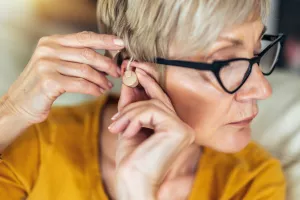About 1 in 8 people in the United States age 12 or older have hearing loss in both ears. If you notice consistently muffled sounds or have a hard time filtering out background noise, you may be experiencing the first signs of hearing loss.
Helping you rediscover sound
Experiencing signs of hearing loss can be overwhelming and frustrating. You might notice that you need to turn up the TV volume more than usual or that you're asking people to repeat themselves a lot. These are common signs of hearing loss.
Not all hearing loss is the same, though. At Tufts Medicine, we’ll help you explore hearing aid options that are best for your needs. If you're hearing the world around you for the first time, we’ll be here to support you and make the transition easier.

Conditions
You might lose your hearing because of different problems with your ears. Hearing loss can happen in three main ways, depending on where the issue is: conductive (affecting your outer or middle ear), sensorineural (affecting your inner ear), or mixed (a combination of both). Some causes include:
- Acoustic neuroma
- Autoimmune disease
- Congenital malformations
- Eardrum perforation
- Meniere's disease
- Otosclerosis
- Otitis Media
- Presbycusis (age-related hearing loss)
Testing
Our team of licensed audiologists will conduct a variety of diagnostic tests to get to the bottom of your hearing problem. These tests may include:
- Pure tone air and bone conduction testing
- Speech audiometry testing
- Immittance battery testing
- Distortion-product otoacoustic emissions (DPOAEs) testing
After the evaluation is complete, your audiologist will determine your severity and type of hearing loss to create a personalized treatment plan.
Treatments
When you think of hearing aids, you might imagine something a grandparent or older relative once wore - bulky, constantly needing adjustment and prone to harsh feedback.
Hearing aid technology has improved dramatically over the years. What you can find today offers higher sound quality, more connectivity options and a sleeker look than the devices of the past.
When selecting a hearing aid, your audiologist will consider many factors to find the right one for you, such as:
- Anatomy of your ear
- Cost
- Desire for wireless connectivity
- Hearing loss severity
- Personal preferences
- Your ability to use your hands and fingers with small objects
Implantable hearing devices + cochlear implants
Different from traditional hearing aids that are worn in or behind the ear, an implantable hearing device is a more permanent solution that's surgically implanted in the ear to amplify sound. Together, we'll explore whether a bone-conduction hearing aid or cochlear implant is right for you.

From regular office visits to inpatient stays, find the healthcare you need and deserve close to home.

Meet the doctors and care team devoted to supporting you every step of the way along your path to better health.